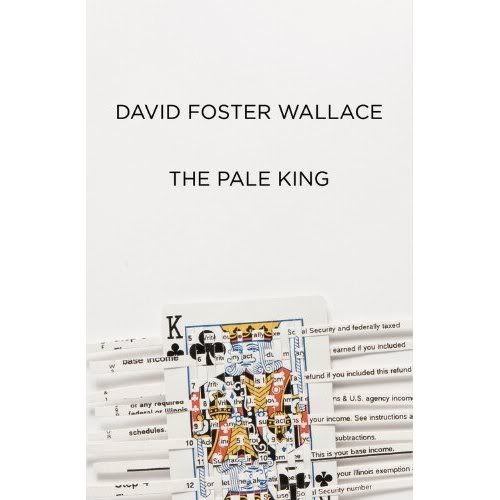The Pale King, unlike any of Wallace’s previously-published fiction, includes sections of first-person memoir. Chapter 9 begins, “Author here. Meaning the real author, the living human holding the pencil, not some abstract narrative persona.” This chapter goes on to describe Wallace’s actual experiences working at an IRS office in the mid-1980s, the office where the book is set.
He also describes some of the research he did for The Pale King, which involved reading the transcripts of the entire two years of debate that ultimately led to the 1986 Tax Reform Act. These debates, which Wallace describes as “collections of anaerobic men in drab suits who spoke a verbless bureaucratese,” are all a matter of public record, but few, if any, had the patience and interest to actually read them.
“Not one journalist,” Wallace writes, “seems ever to have checked them out, and with good reason. This stuff is solid rock. The eyes roll up white by the third or fourth paragraph. You just have no idea.”
The Tax Reform Act of 1986, which had tremendous real-world impact on the lives of most Americans, was insulated from public debate and scrutiny precisely because of its size and, frankly, dullness.
Enter David Foster Wallace who, in a footnote writes, “I’m reasonably sure that I am the only living American who’s actually read all these archives all the way through.”
So what’s the big deal? Why read all that mindless bureaucratese? Because it affects our lives in profound ways. Consider the fact that, according to Wallace, who should know, “The tax laws right now are practically down on one knee, begging upper-income Americans to take advantage of this provision…to S-corp yourself and let the corporation make an additional annual pension contribution, over and above your IRA, as a contractual ‘employee benefit,’ thereby exempting that extra amount from your taxable income…The trick, of course, is earning enough to qualify as an upper-income American.” In other words, the tax laws favor the wealthy.
What keeps most Americans from being able to create any real change is the isolation, size, and dullness of, for example, the U.S. Tax Code. And yet, as Wallace suggests at the closing of Chapter 9, “There may, though, I opine, be more to it…as in vastly more, right here before us all, hidden by virtue of its size.”
So what does this have to do with heroism? The kind of hero suggested by The Pale King, I think, is the reader. The one who is willing to cast aside the distractions of popular media, and dive, head first, into the real shit. For Wallace, it was the tax code debates. You have to pick your battles.
For me, the new hero is not necessarily the one who wields the gun or baton or fire hose. The new hero is the one who is willing to attend city council meetings, read the Iraq War Logs, carefully follow campaign contributions to politicians, read local history archives. In other words, the new hero is a reader. He is the one who dives into the apparent dullness to pluck the human truth from within it.
I can relate, in some ways, to Wallace’s project. For the past six or seven months, I have been researching local history. Reading oral history projects, academic papers, newspaper accounts, and basically scouring the shelves of the Fullerton Public, Fullerton College, and Cal State libraries. Sometimes, I am fairly certain, I am the only person to read some of the stuff I’ve been reading. On the surface, it is quite dull. Who would want, for example, to read the entire transcript of an interview with the director of the Metropolitan Water District?
But what I’ve found has completely blown my mind. If you follow my blog, you know what I’m talking about. And it was always right here, right under my nose, waiting for…a reader, and perhaps a writer to tell the previously hidden story.

